When deciding what to feed your horse, it depends on their breed, weight, activity level, and what they are used for.
This post will talk about honey, if it is safe for horses to eat, and if so, how much?
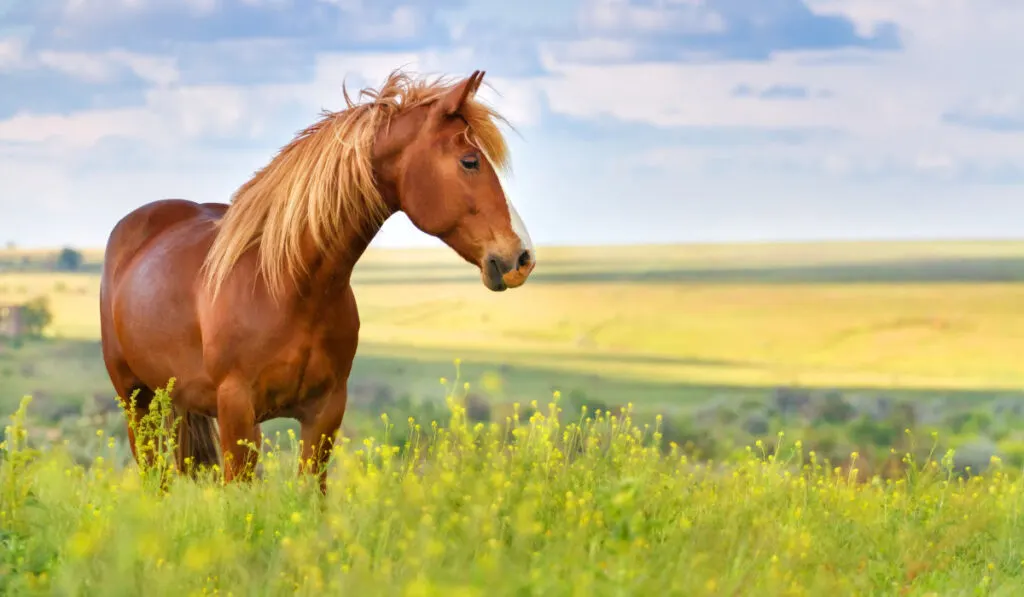
It will also include special honey-based treats for your furry friend. Read on to learn more!
Horses can eat honey. Similar to humans, small amounts can provide numerous nutritional benefits.
Table of Contents
Honey
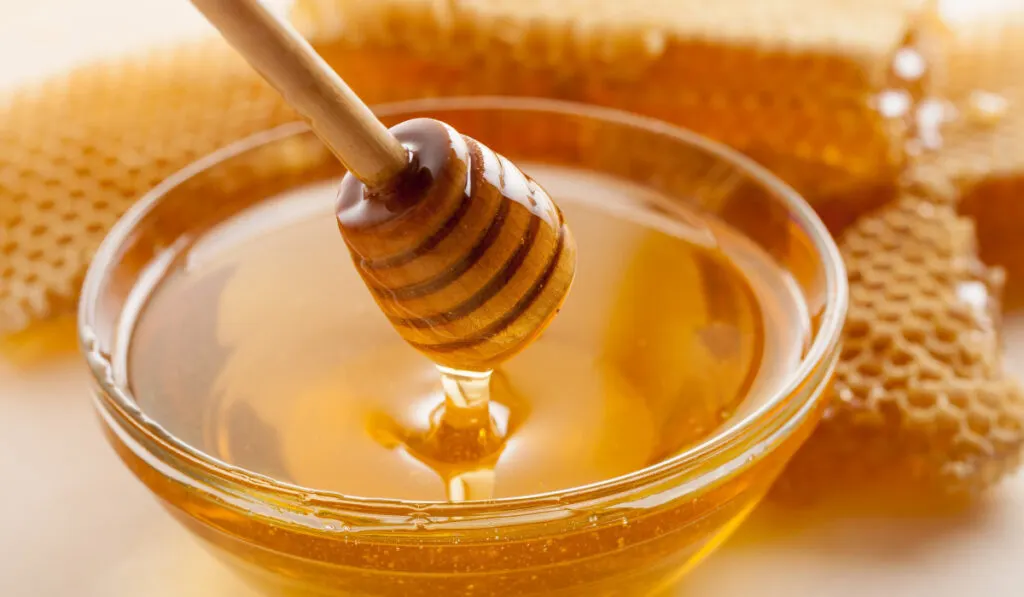
Honey is a substance acquired by bees as sweet, sticky nectar collected from flowers.
It is yellowish-brown in color and is a healthy alternative sweetener. It is popular as anything from toast spreads to mixing in tea.
While its use originated in Africa, this nectar has become popular across the world from the United States to the United Kingdom. Honey has become a healthy and popular option in the world of food, for humans and animals.
Here is a complete list of the most common types of honey.
1. Wildflower honey
Wildflower honey, as the name suggests, is made from the nectar of various wildflowers. Depending on the season, the taste, scent, and color may be different.
Regardless of all these factors, it is all-natural, unless the label says otherwise, and is perfectly fine to feed to your horse.
However, the honey from some wildflowers may cause allergies in individual horses, so it is important to be aware of this possibility and always stay vigilant for your horse’s health.
2. Raw honey
Raw honey is a type of wildflower honey. Honey is typically made from the nectar of bushes and trees, so the difference here is that wildflower honey is made solely from herbaceous flowers.
One tablespoon of raw honey contains about 17 grams of sugar. For humans, this may not seem like a lot, however, it is more of a concern for horses due to their different digestive systems.
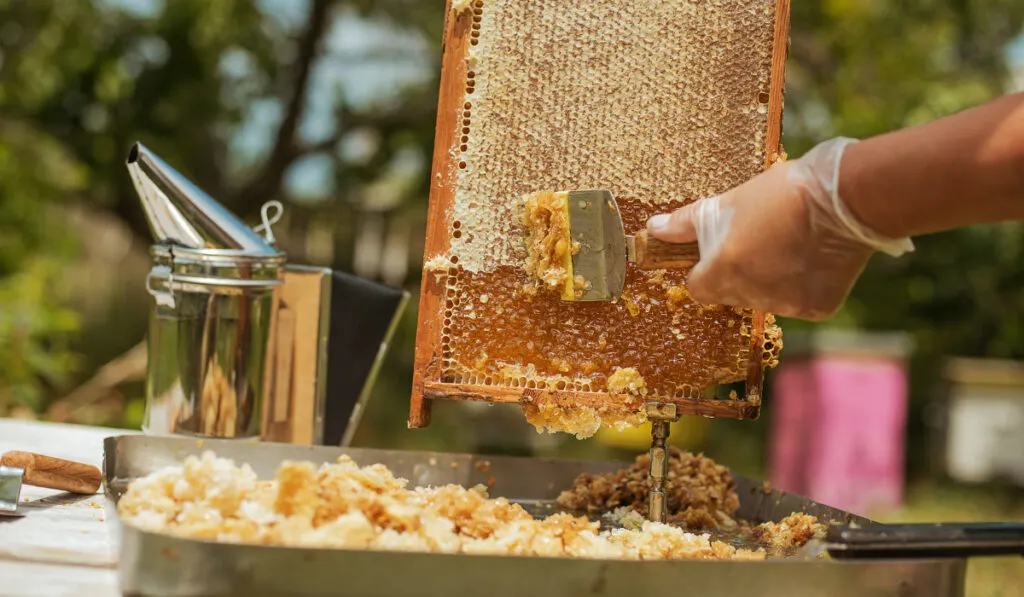
Because of this high sugar content, honey is a steady, reliable source of energy for horses to consume. This is a very sweet foodstuff and may be difficult to feed to pickier horses.
Nevertheless, there are ways to feed honey to lazy or sleepy horses by making it taste a little less sweet.
When consuming any food, whether human or animal, small portions are the best idea.
When giving horses honey, it is vital to give them small amounts either on a carrot (or any other produce) or in a treat. A little amount goes a long way for both their health and energy levels!
3. Artificial honey
Artificial honey starts as natural honey made by bees. It becomes artificial when manufacturers and suppliers add in other syrups and sugars as flavors or to increase their production volume.
These additives may be man-made or naturally occuring, such as corn syrup or cane sugar, and can be hard for a horse’s digestive system to process.
4. Pure honey
Pure honey is different from raw honey in that it is pasteurized, but it does not contain any added ingredients. Similar to raw honey, it is straight from the hive.
However, pure honey is pasteurized, which means the naturally occurring yeast found in raw honey is destroyed by a heating process.
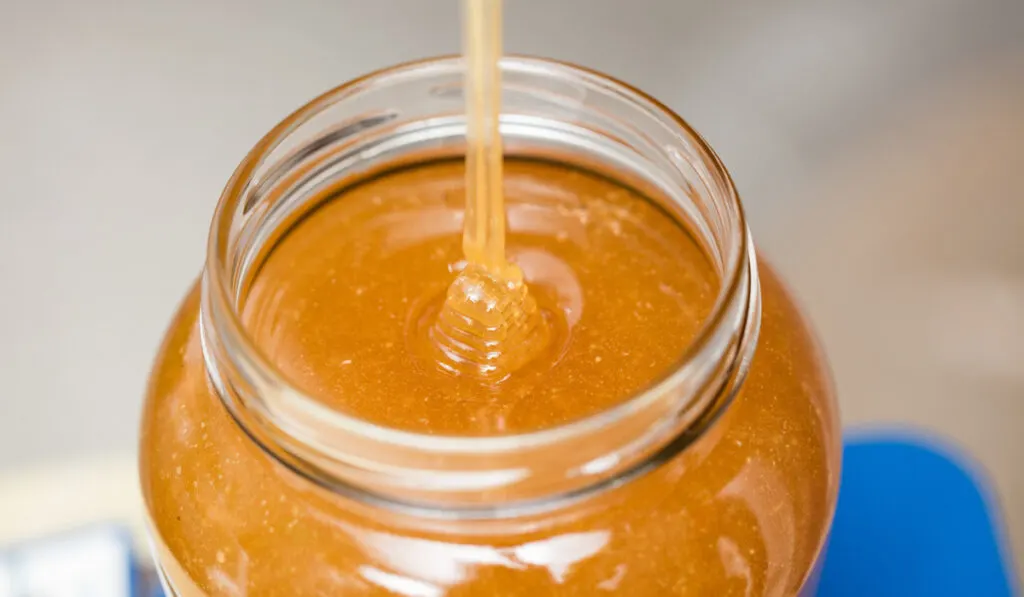
Overall, pasteurization extends shelf life and makes the product have a smoother taste that is popular for cooking.
Some may argue this is better for horses due to the lack of potentially toxic yeast. Either way, pure honey is a natural substance and is safe for horses to eat in small doses.
How much honey?
Generally, honey contains a high amount of sugar regardless of the type. One tablespoon of honey provides 17 grams of sugar out of a horse’s recommended dose of 40-100 grams of sugar daily.
If a horse exceeds this amount, it can cause high blood pressure and even illness. As they have very sensitive digestive systems, overeating sugar of any kind may cause gastrointestinal problems.
Overall, honey is not a bad thing. It is a good source of energy for horses, and in moderation is ok, but overdoing it will cause problems.
Health benefits found in honey
- Calcium- helps play a role in the integrity of the bone structure. Helps decrease the chances of blood clotting and potentially helps enzyme regulation.
- Vitamin A- helps aid in immune health, the development of genes, and helps regulate metabolism.
- Vitamin B- aids in performance, reproduction, energy, and the maintenance of the immune system.
- Protein- builds quality hair for the mane and tail, and aids in the health and maintenance of enzymes, organ tissue, eyes, blood, and bones.
- Antioxidants- protect cells from damage as well as promote a healthy heart.
External benefits
Soothes irritation and wounds
Honey can be applied to eternal wounds including cuts, scrapes, and bites. It provides the right ingredients that help these wounds to close and heal faster.
Important to remember
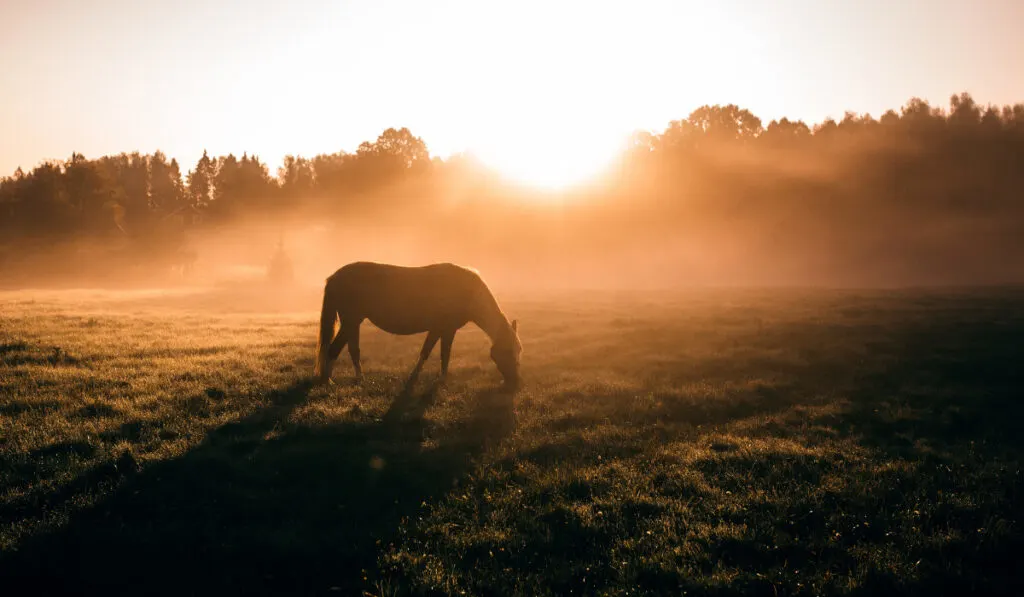
- Horses have a highly sensitive digestive system, do not overfeed them sugars, which includes honey.
- Feeding your horse clean and pure honey is the best, most natural way to provide energy and health benefits to your furry friends.
- It is important to know that honey, although having many health benefits is not a substitute for medical assistance. This being the case, it is important to talk to a veterinarian if there is a cause for concern for whatever reason, especially if finding an allergy or reaction to honey.
Treats
Because of the little amount a horse should have, you should know how much honey to put into treats when making them, and how much bought treats contain.
It is important to determine the correct, moderate amount to keep your horse energized and healthy without getting them too hyper on too much sugar.
It is a good rule of thumb to add less honey than other ingredients to homemade treats. There is a list of recipes below that you can try out.
But overall, no more than one cup of honey is required or necessary when making horse treats.
When buying horse treats, it is a good idea that a bag of horse treats should contain less than a tablespoon of raw honey per treat.
Treat recipes
There are various ideas when it comes to making treats for a horse yourself. Here are three DIY recipes that can be done easily from home!
- 1 thinly sliced apricot
- 1 thinly sliced banana
- 1 cup honey
- 2 ½ cup oats
- 2-3 tbsp vegetable oil
- 1/4 tsp salt
- 1 1/2 cup oats
- Optional- horse feed hay
This mixture can be rolled into balls, or shaped into squares before baking.
*Preheat the oven to 325°F degrees and cook for 30-40 min.*
Let the treats cool down completely before serving to your horse.
Another recipe includes:
- 1 cup thinly sliced carrots
- 2 large thinly sliced apples
- 2 tbsp applesauce
- 1/4cup honey
- 1 cup oats
- 1 cup flour
- 1tsp cinnamon
*Preheat the oven to 350F degrees and cook for 20-25 minutes either as rolled balls, squares or cut with a cookie cutter for a fun way to include shapes into your horse’s diet!
The last treat recipe includes:
- 1 cup oats
- 1/2 cup flour
- 1/2 cup flax meal
- 3 tbsp coconut oil
- 1/2tsp baking soda
- 1/2tsp baking powder
- 1/2tsp cinnamon
- ½ cup honey
- 1 thinly sliced apricot
*Cook the same as the recipe above*
These treat ideas and recipes are a fun and creative way to reward your four-legged friend, I hope you enjoy these recipes and try them out. They are healthy, nutritious, and full of flavor. Be careful not to overfeed these treats and save them for special occasions!
You can use any fruits or vegetables along with fiber as long as it is in small doses and served in moderation to avoid sickness or digestion problems.
Cost and overview
Overall, honey, much like horses, comes in a variety of sizes, colors, and types. It is important to provide your horse with the very best to ensure health and happiness, whether it’s for treats or regular food.
Here is an overview of the different types of honey mentioned above. I hope you have many great memories with your equine friend!
| Honey | Cost (on average) |
| Wildflower honey 32oz | $3.45-$7.50 |
| Raw honey 32oz | $5.50-$25.50 |
| Pure honey 32 oz | $10.00-$24.50 |
| Artificial honey 32oz | 3.75-12.50 |
Sources
- https://www.kvsupply.com/content/equine/six-easy-to-make-homemade-horse-treat-recipes/
- https://www.horsealot.com/answers/595fe4cc9a6d9cb5488b4567/horses-have-honey
- https://thehorse.com/160523/feeding-honey-to-horses/
- https://theconversation.com/what-is-fake-honey-and-why-didnt-the-official-tests-pick-it-up-102573
- https://www.medicalnewstoday.com/articles/324966
- https://www.healthline.com/nutrition/raw-honey-vs-regular
- https://hygain.com.au/blogs/library/mineral-nutrition-importance-calcium-phosphorus
- https://foranequine.com/us/expert-advice/b-vitamins-and-horses/

